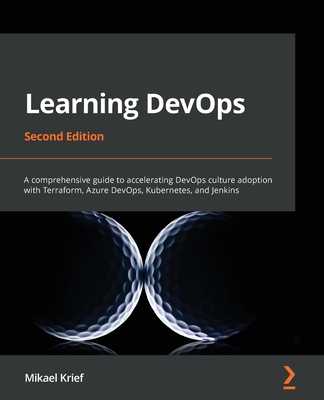Learning DevOps
暫譯: 學習 DevOps
Krief, Mikael
- 出版商: Packt Publishing
- 出版日期: 2019-10-25
- 售價: $1,510
- 貴賓價: 9.5 折 $1,434
- 語言: 英文
- 頁數: 504
- 裝訂: Quality Paper - also called trade paper
- ISBN: 1838642730
- ISBN-13: 9781838642730
-
相關分類:
DevOps
-
其他版本:
Learning DevOps : A comprehensive guide to accelerating DevOps culture adoption with Terraform, Azure DevOps, Kubernetes, and Jenkins, 2/e (Paperback)
商品描述
The implementation of DevOps processes requires the efficient use of various tools, and the choice of these tools is crucial for the sustainability of projects and collaboration between development (Dev) and operations (Ops). This book presents the different patterns and tools that you can use to provision and configure an infrastructure in the cloud. You'll begin by understanding DevOps culture, the application of DevOps in cloud infrastructure, provisioning with Terraform, configuration with Ansible, and image building with Packer. You'll then be taken through source code versioning with Git and the construction of a DevOps CI/CD pipeline using Jenkins, GitLab CI, and Azure Pipelines. This DevOps handbook will also guide you in containerizing and deploying your applications with Docker and Kubernetes. You'll learn how to reduce deployment downtime with blue-green deployment and the feature flags technique, and study DevOps practices for open source projects. Finally, you'll grasp some best practices for reducing the overall application lead time to ensure faster time to market.
By the end of this book, you'll have built a solid foundation in DevOps, and developed the skills necessary to enhance a traditional software delivery process using modern software delivery tools and techniques
- Become well versed with DevOps culture and its practices
- Use Terraform and Packer for cloud infrastructure provisioning
- Implement Ansible for infrastructure configuration
- Use basic Git commands and understand the Git flow process
- Build a DevOps pipeline with Jenkins, Azure Pipelines, and GitLab CI
- Containerize your applications with Docker and Kubernetes
- Check application quality with SonarQube and Postman
- Protect DevOps processes and applications using DevSecOps tools
- Learn to utilize business resources effectively to increase productivity and collaboration
- Leverage the ultimate open source DevOps tools to achieve continuous integration and continuous delivery (CI/CD)
- Ensure faster time-to-market by reducing overall lead time and deployment downtime
商品描述(中文翻譯)
實施 DevOps 流程需要有效地使用各種工具,而這些工具的選擇對於專案的可持續性以及開發(Dev)和運營(Ops)之間的協作至關重要。本書介紹了您可以用來在雲端中配置和設置基礎架構的不同模式和工具。您將首先了解 DevOps 文化、DevOps 在雲端基礎架構中的應用、使用 Terraform 進行資源配置、使用 Ansible 進行配置,以及使用 Packer 進行映像構建。接著,您將學習如何使用 Git 進行源代碼版本控制,以及如何使用 Jenkins、GitLab CI 和 Azure Pipelines 構建 DevOps CI/CD 管道。本 DevOps 手冊還將指導您如何使用 Docker 和 Kubernetes 將應用程式容器化並部署。您將學習如何通過藍綠部署和功能標誌技術來減少部署停機時間,並研究開源專案的 DevOps 實踐。最後,您將掌握一些最佳實踐,以減少整體應用程式的交付時間,確保更快的上市時間。
在本書結束時,您將建立堅實的 DevOps 基礎,並發展出使用現代軟體交付工具和技術來增強傳統軟體交付流程所需的技能。
- 熟悉 DevOps 文化及其實踐
- 使用 Terraform 和 Packer 進行雲端基礎架構配置
- 實施 Ansible 進行基礎架構配置
- 使用基本的 Git 命令並了解 Git 流程
- 使用 Jenkins、Azure Pipelines 和 GitLab CI 構建 DevOps 管道
- 使用 Docker 和 Kubernetes 將應用程式容器化
- 使用 SonarQube 和 Postman 檢查應用程式質量
- 使用 DevSecOps 工具保護 DevOps 流程和應用程式
- 學習有效利用商業資源以提高生產力和協作
- 利用最終的開源 DevOps 工具實現持續集成和持續交付(CI/CD)
- 通過減少整體交付時間和部署停機時間來確保更快的上市時間












